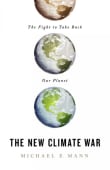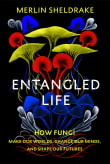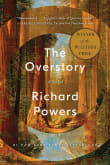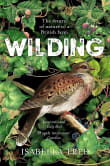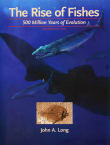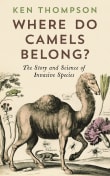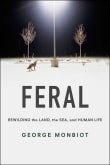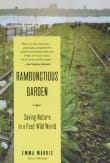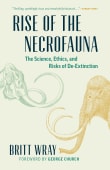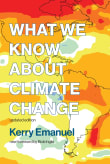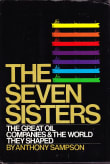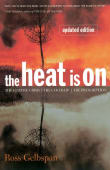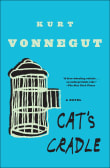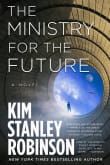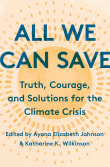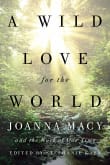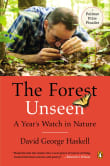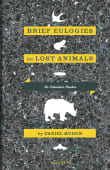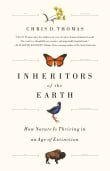The Sixth Extinction
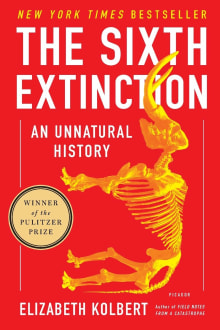
Book description
Over the last half a billion years, there have been five mass extinctions of life on earth.
Scientists around the world are currently monitoring the sixth, predicted to be the most devastating extinction event since the asteroid impact that wiped out the dinosaurs.
Elizabeth Kolbert combines brilliant field reporting, the…
Why read it?
9 authors picked The Sixth Extinction as one of their favorite books. Why do they recommend it?

I loved this book because of its discussion of paleontology (which has always interested me) and the extinctions prior to this one. But I also loved Kolbert’s description of the history of paleontology itself—specifically, how the discovery of fossils triggered a crisis in our understanding of ourselves and our world.
Like some of my other selections, this book made me think about humanity’s relationship to the planet and the other life we share it with.
From Debra's list on environmental health or climate change.

Elizabeth Kolbert is a respected science writer. In this book, she pieces together hard facts, historical background, and personal stories to help us understand the 6th extinction currently underway.
This deeply researched book doesn’t just leap to blame climate change (which is a factor) but looks at this loss of biodiversity through a much wider lens of humankind’s impact on our environment. Kolbert is a gifted writer and entertainer who finds ways to bring humor to this dark subject.
From Caro's list on biodiversity, plants and natural magic.

When you remember that life on our planet has been almost completely annihilated five times already, perhaps it makes you appreciate the ephemerality of our existence, the diversity of flora, fauna, and fungi on earth, our planet’s many gifts, etc. But when you realize that human behaviors in the age of capitalism and globalization are tantamount to the meteor that wiped out the dinosaurs, it makes you want to wake up from this nightmare.
This book offers an amazing history lesson about archaeology and how we have learned about our planet’s ancient history. But it also provides a sobering wake-up…
From William's list on invasive species and their impact on human history.
If you love The Sixth Extinction...

Any book by this writer makes a good read but this one rise above the others—and that is no small feat. This is an odd way to put it but the book brings to life the five catastrophic events that decimated so many species over the course of geological time. The idea of a sixth catastrophic event causing another mass extinction can be seen in human time because human activity is driving the catastrophe. Though it is true that the earth has always had climate change with global warming and cooling, this book shows how dangerous that plain fact can…
From Kenneth's list on the environment for the age of global warming.

This is a book I would want every politician, business leader, and concerned citizen to read to understand what some biologists are calling the ‘biodiversity crisis’. Elizabeth Kolbert is a masterful, entertaining storyteller whose curiosity and sense of wonder are infectious. She tells the story of our understanding of the great variety of life on Earth, the (relatively recent) discovery that extinction is real, and the abundant threats that hang over many species today.
In her reporting from rainforests and reefs, laboratories and museums, Kolbert captures the hopes and fears of many fascinating scientists who are working to save what…
From Mike's list on biodiversity, ecology, and extinction.

Humanity is arguably the antagonist in this lucid, brilliantly researched history of our evolution on Planet Earth, from roughly three hundred thousand years ago to the present moment. Kolbert’s characters include the Panamanian Golden Frog, the great auk, the Sumatran rhino, and the humble brown bat, all of which are former or soon-to-be-former inhabitants of a world disappearing beneath our bipedal feet. By combining journalism, field research, science reporting, and personal accounts, Kolbert traces our evolutionary history and lays bare not just our likely future but also the lack of future we portend for all the biodiversity lost in this…
From Devin's list on getting deep into the climate crisis feels.

I read this book because it got a lot of buzz in articles I read and on podcasts I listened to. The buzz was well deserved. This book won the 2015 Pulitzer Prize for General Non-Fiction and chronicles the significant impacts mankind is having on the Earth and its inhabitants. What makes the book so interesting is it also talks about past periods of mass extinctions. However, the sixth extinction is different because it is not caused by a catastrophic event, but by one species, Homo sapiens. It made me think of the collective power our species has and wonder…
From Howard's list on causes and implications of climate change.

Elizabeth Kolbert is a fantastic writer, in this book encapsulating the challenges that biodiversity faces in modern times. She entwines narratives about endangered species, about the people trying to discover why they are threatened, and contemplating how - if at all - it might be possible to repair some of the damage. A sixth extinction would indeed be an extraordinary outcome of the evolution of humans - if it comes to pass. Understanding how it may be emerging is something every concerned (and not so concerned) person should know. Where Elizabeth Kolbert succeeds so well is by revealing such a…
From Chris' list on biodiversity change.

This is my “stretch” book. It’s not directly about curious extinct creatures from deep time, but you should read it. Yes, extinction is a natural part of evolution. But Kolbert’s riveting book inventories the accelerating loss of species across our planet. This modern mass extinction and other human-induced global changes have spurred the suggestion that a new geologic period be named to capture what’s going on: Dutch chemist Paul Crutzen coined the term “Anthropocene” in an essay called “Geology of Mankind.” What will be the “biostratigraphic signature” of this time be a million years from now? The sad answer will…
From Susan's list on curious creatures from deep time.
Want books like The Sixth Extinction?
Our community of 12,000+ authors has personally recommended 100 books like The Sixth Extinction.

